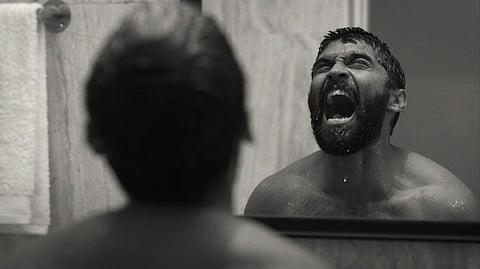Bison Kaalamaadan (2025) is directed and written by Mari Selvaraj.
The film features Dhruv Vikram, Pasupathy, Ameer, Lal, Anupama Parameswaran, Rajisha Vijayan, Hari Krishnan, Azhagam Perumal and Kalaiyarasan.
The sports drama sensitively captures way beyond what happens on the field quite triumphantly.
Bison Kaalamaadan Review | Defying The Usual Sports-Underdog Tale
Bison Kaalamaadan (2025) adapts fragments from the real-life story of Manathi Ganesan and extends beyond biography. It becomes a requiem for those who gave it their all, to lose to a system stacked against them.
As someone who could never sit through a sports drama without checking the clock every ten minutes, Bison Kaalamaadan (2025) cornered me into feeling. The film begins as a familiar tale of athletic perseverance, partly because it disguises itself as a familiar underdog saga, like Dangal (2016) but quickly sheds its genre skin, exposing something rawer. It emerges as a social autopsy on caste violence, the trauma carried in silence, and the politics of survival disguised as sport. Mari Selvaraj doesn’t glorify the grind but questions who’s allowed to dream in the first place.
As in Pariyerum Perumal (2018), Selvaraj returns to his landscape of simmering rage amidst inequality. Here, Kitaan (Dhruv Vikram), a kabaddi player haunted by silence, carries his father’s mantra intently: “It is not the same for us.” When the film opens with Kittaan waiting to play for India in the Asian Games—against Pakistan, no less—the stakes are national, but the story remains achingly personal. Through a series of flashbacks, we witness the shaping of a man who never really had a choice. Each hardship chisels him into someone who doesn’t play for glory but for survival.

Set in Tirunelveli, Bison Kaalamaadan (2025) adapts fragments from the real-life story of Manathi Ganesan and extends beyond biography. It becomes a requiem for those who gave it their all, to lose to a system stacked against them. Selvaraj’s genius lies in how he transforms a sport into a sociological mirror.
The blood spilled in competition is indistinguishable from that spilled in discrimination. Pandiyaraja (Ameer) and Kandhasami (Lal) embody inherited pride and generational violence, while Kitaan’s family — Velusamy (Pasupathy), Raji (Rajisha Vijayan), and Rani (Anupama Parameswaran) — struggle to hold onto dignity like it’s an endangered emotion. The women, much like in Selvaraj’s earlier films, exist at the intersection of resistance and restraint, mostly serving a role only to their male counterparts’ stories.
Dhruv Vikram delivers one of the best performances of his career, as restraint becomes rebellion. The only space where he owns his body, his rage, his rhythm, is that red mud court. There are shades of Sarpatta Parambarai (2021) in how both films weaponize sport as resistance, as Pasupathy inevitably recalls his role in Pa Ranjith’s film. Within this coded violence, kabaddi becomes a space of rebellion, where freedom is momentary but fiercely claimed.

When Kitaan eventually plays for India at the Asian Games — against Pakistan, predictably — the crowd cheers for nationalism. The film, however, whispers something else: this isn’t patriotism; it’s protest. Even the so-called villains of the system are shown with traces of humanity, as though Selvaraj can’t give up on hope entirely. Is this optimism or delusion? Perhaps both. But it’s this complexity that makes Bison feel alive. The film’s world is brutal, yet not devoid of tenderness.
Bison asks an uncomfortable question — how many Kittaan’s stories are still unlived because of the weight of their surnames? Selvaraj refuses to romanticize their struggle or beautify their pain. He treats it as daily reality — neither tragedy nor spectacle, just existence. Even his antagonists aren’t one-dimensional monsters; they are cogs trapped in the same machinery of hate they helped build. Sure, the film lags in parts — the romance overstays, the fights stretch — but maybe that’s the point. Oppression, too, is repetitive, its cycle boring in its predictability. Bison Kaalamaadan doesn’t care to entertain; it chooses to confront. It reminds us that survival itself can be an act of rebellion.

By the end, the film doesn’t hand out easy victories. The film’s power lies in that discomfort. And in true Selvaraj fashion, it reminds us that in a country where caste writes the rules, even playing a fair game is an act of defiance.
